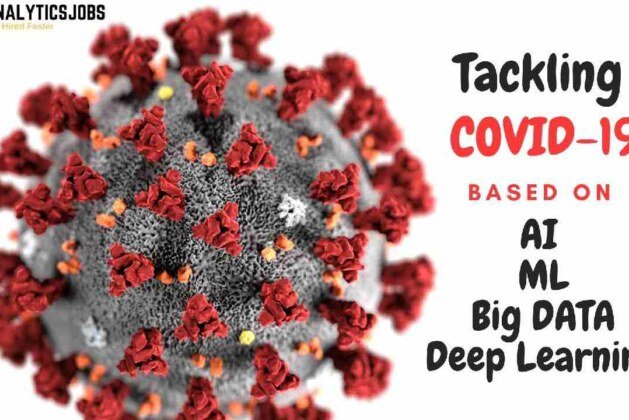Disease outbreaks like the COVID-19 often unfold way too rapidly for researchers to find a cure. However, in the future, artificial intelligence, big data, machine learning, deep learning can help researchers do a much better job.
While it is probably too late now for the fledgling technology to play a significant role in the present pandemic, there is hope for another outbreak. AI is excellent at combing through input data to find connections that help you to figure out what sorts of treatments can work or which experiments to get following like coronavirus usually unfold far too quickly for scientists to look for a solution.
The major question is what will Big Data come up with when it barely gets meager scraps of data on illness like COVID-19, it first emerged late last year in China and has sicked 75,000+ people in 2 months.
To stand against or fight the novel coronavirus originated in Wuhan, China, researchers are using artificial intelligence to explore possible remedies, which include already approved drugs and totally new compounds. At exactly the same time, the pneumonia-like illness has just gotten more intense.
There are various start-ups or organizations using technologies to face such outbreaks.
Some of them standing against COVID-19 are listed below
- Researchers at Benevolent AI an artificial intelligent start-up in the British wanted to find a drug already-approved that could help in blocking the infection process. Based on the chemical properties assumed COVID-19 could possibly have they sent their AI looking for a drug remedy, through a database of an enormous amount of medical data, including scientific literature.
The system churned out various options, which were after then whittled down to recognize an already approved drug referred to as Baricitinib, which is usually used to cure moderate and severe rheumatoid arthritis. The researchers recommend it can be trialed as a potential treatment. Ivan Griffin, co-founder at Benevolent said that even though the company hasn’t applied for the right to evaluate the drug in China, it’s reached out to manufacturers that are already producing the drug. It is not clear exactly how long it may take before an adequately tested drug reaches patients.
Baricitinib is not the only treatment researchers have recommended, however, in China, they have applied to evaluate a minimum of 10 medications as a potential treatment, based on the Wall Street Journal, although none has but been approved. Remember that misinterpretations of the science regarding coronaviruses have exacerbated misinformation connected to the novel Wuhan strain.
- After receiving a blood sample from one of the primary U.S. patients to recover from COVID-19. AbCellera, a Canadian therapeutic antibody discovery organization, places its rapid pandemic response platform to do the job, identifying more than 500 distinctive fully human antibody sequences, probably the largest board of anti-SARS-CoV-2 anti-bodies reported till date.
Eli Lilly will partner with Vancouver, BC-based AbCellera to co-develop by far the most promising of those people 500+ anti-bodies, through a collaboration whose value wasn’t disclosed. The organizations are going to carry out their co-development work following AbCellera faucets into the knowledge of an additional partner – the Betty and Dale Bumpers Vaccine Research Center on the NIH’s.
“We are intending to find out very quickly which ones of those 500 will be a helpful neutralizer through our partnership on the Vaccine Research Center,” Ester Falconer, Ph.D., AbCellera’s Head of Development and Research. We are likely to have that data really fast, which will help us down select a selection to create together with our partners at Lilly for additional manufacturing and further testing.
If successful, Lilly mentioned, it will join hands with global regulators to bring treatment to patients. The 2 organizations each use a group of human researchers to work together with the AI to guide the process.
- In Exscientia’s method, dubbed the Centaur Chemist, drug designers assist show the algorithms techniques for trying to find compounds. Healx places the AI’s predictions to researchers that evaluate the results and determine what to pursue.
- Neil Thompson, Healx’s chief science officer, stated the method might be used from an outbreak such as coronavirus so long as they had enough data on the new illness. Healx is not working on dealing with the coronavirus or tweaking its technology for outbreaks, though it would not be a stretch.
- Artificial intelligence algorithms have already beginning to churn out medicines for the diseases we know about. Researchers on the Massachusetts Institute of Technology stated on Thursday that they would employ the technique to determine a highly effective new antibiotic compound that could wipe out an array of troublesome bacteria, even though some which are presently resistant to various other treatments.
One catch for each one of these technologies is clinical testing. Even medicines by now safe for use to cure one ailment must be tested once again before they are prescribed for another. The method of showing they’re effective and safe on a substantial amount of patients is able to take many years before you go to regulators for feedback.
To be effective, AI-based drug developers will have to plan in advance, choosing a virus genome prone to cause difficulties in the future and focusing on it when there are very few incentives to do it.
Another but the most difficult factor is finding qualified staff.
“It’s difficult to find people who could operate with the intersection of artificial intelligence with biology, and also it is tough for large organizations to make fast decisions on technology like this, stated Irina Haivas. It’s not sufficient to become an AI engineer, you’ve to recognize and get into the applications of biology too.”
The coronavirus of 2019 (COVID-19) is being resolved with Artificial Intelligence & Data Science



